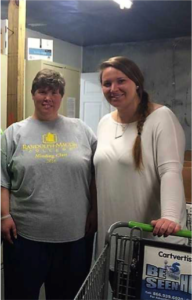Forging New Friendships through Community Service
Those who are not looking for happiness are the most likely to find it, because those who are searching forget that the surest way to be happy is to seek happiness for others. -Martin Luther King, Jr.

Linda and Hannah at ACES (from left to right)
Inclusive volunteering gives people with and without IDD the opportunity to meet new people in the community while helping those in need. These new connections can lead to long-lasting friendships that impact not only community members being served by the volunteers but the volunteers themselves.
This past year, The Arc of Hanover in Ashland, Virginia, received a grant to work on The Arc’s Martin Luther King, Jr. Day of Service project.*
The Arc of Hanover’s Executive Director, Caroline Kistler, saw this grant as a key opportunity not only to serve people in need but also as an opportunity to help build friendships between young men and women of all abilities in the community. “Making friends with people different from yourself opens you up to new experiences, and allows you to see life from someone else’s perspective. As is true of all friendships, friendships among people with different abilities expand a person’s support system, and have a positive impact on a person’s life.”
Caroline recruited young adults with IDD at The Arc of Hanover and students at Randolph-Macon University to volunteer at Ashland Christian Emergency Services (ACES), a local nonprofit that provides food, clothing, and aid to people in need in the community. Caroline paired volunteers with and without IDD together so that people would be able to meet new people and learn from each other.
One pairing was Randolph-Macon University student Hannah Sommer and Linda George. While they were serving others, Hannah and Linda struck up a friendship. Hannah shared, “I always looked forward to spending time with her and the other students in the class. I was sad when the semester ended because I did not think I would get the opportunity to interact with the members of The Arc anymore.”
However, Hannah did have an opportunity to continue her connection with The Arc of Hanover as an intern the following semester. She appreciates that the internship “has allowed me to still keep in touch with Linda and the members of The Arc frequently, and has allowed me to learn so much about the disability community.” For Hannah, her relationship with Linda has been an important experience for her, and one that has been more meaningful because they met through service. “The relationships that are built and the friendships that are made through inclusive volunteering are like no other. Not only does the act of volunteering with a person with an intellectual or developmental disability benefit yourself and that individual, but together, you are working to benefit the lives of others.”
For Linda, befriending Hannah and volunteering with her has been important to her. “I liked working with Hannah and helping people. It was fun being able to volunteer with my friend. It feels good to be able to help people. I enjoyed being with Hannah.”
We hope that Linda and Hannah, and other volunteers paired through this program will continue their friendship, and continue serving their community! For people interested in learning more about The Arc’s MLK Day of Service Project, inclusive volunteering, and how volunteering can help people grow new relationships, visit https://www.thearc.org/inclusive-volunteering.
*In 2015, The Arc was selected by the Corporation for National and Community Service (CNCS), the federal agency that leads the Martin Luther King, Jr. Day of Service, to plan and execute volunteer projects that unite Americans in service for the MLK Day of Service and throughout the year. To date, 16 chapters of The Arc around the country have organized inclusive volunteer service projects where people with intellectual and developmental disabilities (IDD) volunteer alongside people without disabilities to provide food to people in their communities who are in need. In total, these projects have brought together over 1,000 volunteers to serve more than 14,000 people in need.








